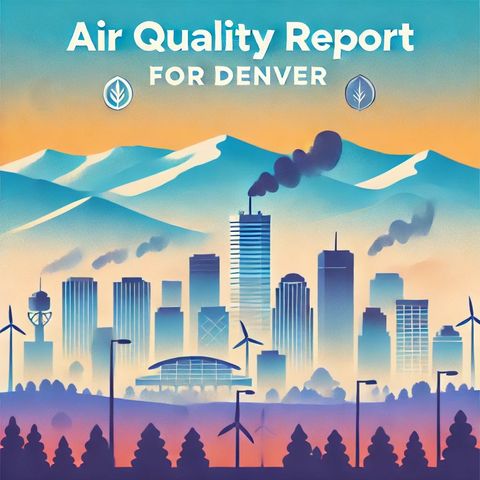Denver's Air Quality Moderate, Residents Advised to Limit Outdoor Activities

Sign up for free
Listen to this episode and many more. Enjoy the best podcasts on Spreaker!
Download and listen anywhere
Download your favorite episodes and enjoy them, wherever you are! Sign up or log in now to access offline listening.
Description
Denver's air quality has become an increasingly important topic as the city's population and industrial activities continue to grow. Today, air quality in Denver is classified as moderate according to...
show moreThe main contributors to Denver's air quality status today include particulate matter, ozone, nitrogen dioxide, and carbon monoxide levels. Particulate matter, or PM2.5, refers to tiny particles that measure less than 2.5 micrometers and can penetrate deep into the lungs, potentially causing respiratory problems. Ozone pollution, often referred to as smog, is another significant concern, particularly affecting individuals with asthma and other respiratory conditions. Nitrogen dioxide and carbon monoxide levels, while lower, contribute to the overall air quality and are primarily emitted from vehicle exhaust and industrial sources.
Weather conditions play a crucial role in Denver's air quality. Today, the weather patterns are not conducive to dispersing pollutants effectively. Temperature inversion, a phenomenon where a layer of warm air traps pollutants near the surface, is contributing to the moderate air quality. Wind patterns are weak, meaning pollutants are lingering longer over the city, instead of being carried away.
Denver's geography also influences its air quality. The city is situated in a high-altitude basin surrounded by mountains, which can trap pollution. This natural bowl effect can exacerbate the buildup of air pollutants, especially during the winter months when temperature inversions are more common.
Government agencies and local authorities are actively monitoring air quality and providing updates to the public. Residents are advised to limit strenuous outdoor activities, especially those with preexisting health conditions. Schools and healthcare facilities are also on alert, ensuring vulnerable groups such as children and the elderly are adequately protected.
Several initiatives are underway to improve Denver's air quality. The city is actively promoting public transportation, encouraging carpooling, and increasing the use of electric vehicles to reduce emissions. Stringent regulations on industrial emissions and programs aimed at reducing residential wood burning are also in place to combat air pollution.
In conclusion, while Denver's air quality is currently moderate, it is essential for residents to stay aware of the AQI and take necessary precautions. Efforts to reduce pollution sources are ongoing, with the goal of ensuring cleaner air for all. The combination of community efforts, technological innovations, and regulatory measures will be crucial in improving and maintaining healthy air quality levels in Denver.
Information
| Author | QP-5 |
| Organization | William Corbin |
| Website | - |
| Tags |
Copyright 2024 - Spreaker Inc. an iHeartMedia Company
